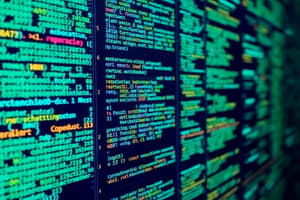Podcast
Questions and Answers
What is a consequence of too much information for a decision maker?
What is a consequence of too much information for a decision maker?
- Enhanced decision-making speed
- Information overload (correct)
- Clear understanding of priorities
- Increased productivity
Which characteristic of information indicates that it can be checked for accuracy?
Which characteristic of information indicates that it can be checked for accuracy?
- Verifiable (correct)
- Timely
- Valuable
- Relevant
What does an Information System consist of?
What does an Information System consist of?
- Only software components
- Only hardware components
- A single database
- A set of interrelated components (correct)
What is the role of feedback in an Information System?
What is the role of feedback in an Information System?
What differentiates Computer-Based Information Systems from Manual Information Systems?
What differentiates Computer-Based Information Systems from Manual Information Systems?
Which component of a Management Information System consists of computer programs?
Which component of a Management Information System consists of computer programs?
How do Management Information Systems (MIS) primarily aid organizations?
How do Management Information Systems (MIS) primarily aid organizations?
What is the primary function of the 'output' in an Information System?
What is the primary function of the 'output' in an Information System?
What is the primary difference between data and information?
What is the primary difference between data and information?
Which characteristic of valuable information ensures that it is free from errors?
Which characteristic of valuable information ensures that it is free from errors?
What does 'GIGO' refer to in information systems?
What does 'GIGO' refer to in information systems?
Which characteristic of information allows it to serve multiple purposes within an organization?
Which characteristic of information allows it to serve multiple purposes within an organization?
Why is complete information vital for decision-making?
Why is complete information vital for decision-making?
What characteristic of information refers to its ability to be accessed by authorized users when needed?
What characteristic of information refers to its ability to be accessed by authorized users when needed?
Which of the following is a consequence of not having accurate information?
Which of the following is a consequence of not having accurate information?
Which characteristic ensures that information can be trusted based on its source?
Which characteristic ensures that information can be trusted based on its source?
Study Notes
Data, Information, and Knowledge
- Data: Raw facts, not inherently meaningful
- Information: Organized data with value beyond the facts themselves
- Knowledge: Awareness and understanding of information, deriving insights
Types of Data
- Alphanumeric: Numbers, letters, and other characters
- Image data: Graphic images and pictures
- Audio data: Sound, noise, or tones
- Video data: Moving images or pictures
Characteristics of Valuable Information
- Accessible: Easy access for authorized users, in the right format and time
- Accurate: Error-free, avoid "garbage in, garbage out" (GIGO)
- Complete: Contains all important facts
- Economical: Cost-effective to produce, balancing value vs. cost
- Flexible: Usable for various purposes
- Relevant: Important to the decision maker
- Reliable: Trustworthy, depends on data collection methods
- Secure: Protected from unauthorized access
- Simple: Not overly complex, avoiding information overload
- Timely: Delivered when needed
- Verifiable: Checkable for accuracy, using multiple sources
The Value of Information
- Enables efficient and effective decision-making
- Improves organizational performance
Information System (IS)
- Interrelated components that collect, store, process, and disseminate data and information
- Aims to meet objectives
Components of an Information System
- Input: Gathering and capturing raw data
- Processing: Transforming data into useful outputs
- Output: Production of information in documents and reports
- Feedback: System information used to adjust input or processing
Types of Information Systems
- Manual: Human-powered, e.g., investment analysts drawing charts
- Computer-Based: Using computers, e.g., Management Information Systems (MIS)
Management Information Systems (MIS)
- Combine hardware, software, databases, telecommunications, people, and procedures
- Collect, manipulate, store, and process data into actionable information
MIS Components
- Hardware: Computer equipment for input, processing, and output
- Software: Programs that govern computer operations
- Database: Organized collection of facts and information
- Telecommunications: Electronic transmission of signals
- Networks: Connect computers and equipment
Studying That Suits You
Use AI to generate personalized quizzes and flashcards to suit your learning preferences.
Description
This quiz explores the distinctions between data, information, and knowledge, emphasizing their characteristics and types. It covers various forms of data such as alphanumeric, image, audio, and video data, as well as key traits that make information valuable. Test your understanding of these concepts and their practical applications.




